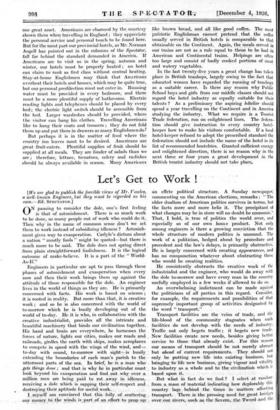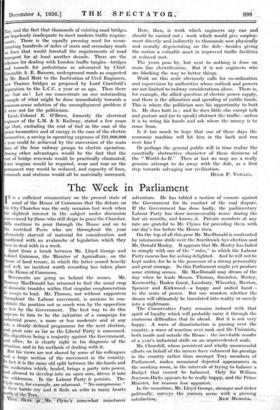Let's Get to Work I
[We are glad to publish the forcible views of Mr. Vowlea, a well- known Engineer, tut they must be regarded as his own.—Ed. SPECTATOR.] N opausing to consider the dole, one's, first feeling is that of astonishment. There is so much work to be done, so many people out of work who could do it. Then why in the name of common sense don't we set them to work instead of subsidizing idleness ? Astonish- ment gives way to exasperation. Carlyle's dictum about a nation " mostly fools " might be quoted—but there is much more to be said. The dole does not spring direct , from plain straightforward foolishness. It is the logical outcome of make-believe. It is a part of the " World- Engineers in particular are apt to pass through these phases of astonishment and exasperation when every now and then their work brings them up against the attitude of those responsible for the dole. An engineer lives in the world of things as they are. He is primarily concerned with facts. His work is based on science ; it is rooted in reality. But more than that, it is creative work ; and so he is also concerned with the world of to-morrow which he is busily developing out of the world of to-day. He it is who, in collaboration with the creative industrialist, provides all the intricate and beautiful machinery that binds our civilization together. His hand and brain are everywhere, he harnesses the forces of nature, lights our cities, makes our roads and , railroads, girdles the earth with ships, makes aeroplanes to compete in speed with the wings of the wind, and—, to-day with sound, to-morrow with sight--7-is busily extending the boundaries of each man's parish 'to the -- uttermost parts of the sea. In brief, he- is a man who- gels things done and that is why he. -in particular must' loOk beyond his exasperation and find out why' over a million men are being paid to rot away in idleness, receiving a dole which is sapping their self-respect and , destroying their aptitude for useful work.
myself am convinced - that this folly of scattering our money to the 'rinds is:part_ of an _effort:: to prop up, , an effete political structure. A Sunday newspaper; commenting on the American elections, remarks : " The older dualism of American politics survives in terms, but the facts more and more belie it. The precipitant of what changes may be in store will no doubt be economic."
That, I hold, is true of politics the world _ over, and especially so of our own home product. Not only, among engineers is there a growing conyietion.that the whole structure of modern politics is unsound. The work of a politician, hedged about by procedure and precedent and the law's delays, is primarily obstructive. He is largely concerned with creating appearances, and has no compunction whatever about obstructing those who would be creating realities.
He consistently obstructs the creative work of the industrialist and the engineer, who would do away with the dole to-morrow and have every man in the country usefully employed in a few weeks if allowed to do so. An overwhelming indictment can be made against the politicians of all parties in this regard. Consider, for example, the requirements and possibilities of that supremely important group of activities designated by the word " transport."
Transport facilities are the veins of trade, and the life-blood of the community stagnates when sue]) facilities do not develop with the needs of industry. Traffic _ not only begets traffic ; it begets new trade. New facilities create new needs, besides giving better service to those that already exist. For this reason our means of transport should be not merely abreast but ahead of current requirernents. They should not only be putting new life into existing business, but bringing to' life 'new business, giving 'vigour and vitality to industry as a whole and to the civilizatioh 'which i• based upon it. But what in fact do we find ? I select at ramior from a mass of material, indicating how deplorably thi- country lags behind the times in matters affecting transport. There is the pressing need for great bridge, over_our rivers, such as the Severn, the Tweed and thc Tay, and the fact that thousands of existing ..road bridges. are hopelessly inadequate to meet modern traffic require- ments. There is the equally pressing need for recon- structing hundreds of miles of main and secondary roads on lines that would forestall the req-uirements of road transport for at least another decade. There are _ the schemes for dealing with London traffic tanglesbridges and tunnels for pedestrians as advocated by Chief- Constable A. E. Bassom, underground roads as suggested by Mr. Basil Mott to the Institution of Civil Engineers, new Thames bridges as proposed by Lord Crawford's deputation. to the L.C.C. a year or so ago. Then there am—but no! Let me concentrate on one outstanding example of what might be done immediately towards a common-sense solution of the unemployment problem if it were not for the politicians. Lieut.-Colonel E. O'Brien, formerly the electrical engineer of the L.M. & S. Railway, stated a few years ago that, excluding the cost of fuel in the case of the team locomotive and of energy in the case of the electric ocomotive, a saving in operating expenses of £21,000,000 year could.* achieved by the conversion of the main ines of the four railviray groups to electric operation. Among other advantages would be the fact that the cost of bridge renewals would be practically eliminated; fewer wagons wonld be required, wear and tear on the )ermanent way would be reduced, and capacity of lines, terminals and stations- would-all be materially increased. Here, then, is work which engineers say can and should' be carried out ; 'work which would give employ- ment directly and indirectly to thousands now physically and morally degenerating on the dole—besides giving the nation a valuable asset -in improved traffic facilities - at reduced cost. _ The years pass, by, , but next to nothing is done on , main line electrification. - But it is not engineers who are blocking the way to better things.
Work on this scale obviously calls for co-ordination and supervision by authorities whose outlook and powers are not liMited to railway considerations alone. There is, for example, ,the allied question of electric power supply, and there is the allocation and spending of public funds: This is where. the politician sees his opportunity to butt in. He does butt in ; and he does little else except talk and posture and (so to speak) obstruct the traffic—unless it is to wring his hands and ask where the money is to come from. , Is it too much to hope that one of these days the economic machine will hit him in the back and run over him ? , Or perhaps the general public will in time realize the essentially obstructive character of these denizens of the ." World-As-If." Then 'at last we may see a really. genuine attempt to do away with the dole, as a first step towards salvaging our civilization.
HUGH P. VOWLES.































































 Previous page
Previous page